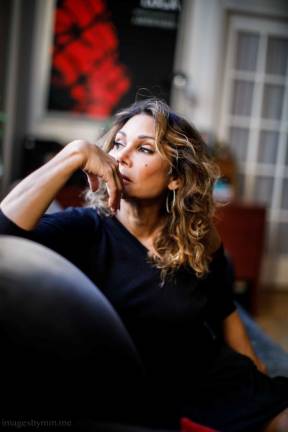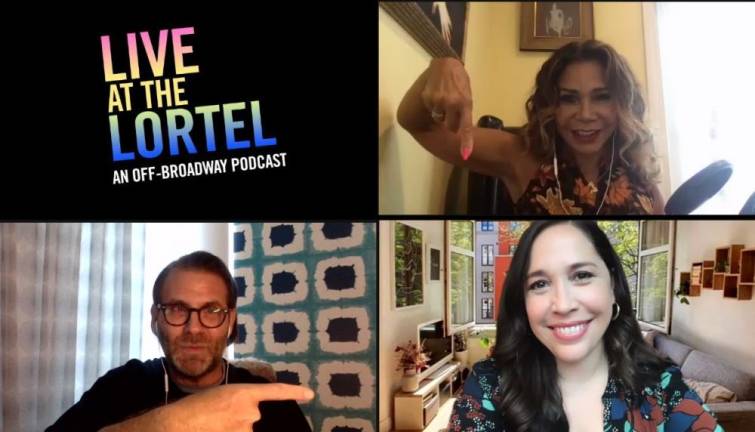Although the return of theater can seem beyond reach, there are artists who are reminding us that nothing can stop stories from still being told. For Daphne Rubin-Vega, the quarantine has allowed her to find new and creative outlets to share her unbridled talent. The Tony nominee is co-hosting the second season of the podcast, “Live at the Lortel,” conversing on Zoom with prominent theater makers about their craft, centered around issues of social justice.
Along with her husband and son in lockdown, she also stars in the new Netflix series, “Social Distance,” which explores the ways in which different characters are coping and connecting during the pandemic. It was filmed entirely remotely, with a camera and PPE delivered to her doorstep.
The Chelsea resident first came onto the Broadway scene by originating the role of Mimi in “Rent,” a job that, almost 25 years later, she still gets asked about every day. A native of Panama, the accomplished actress, whose Broadway resume also includes playing Fantine in “Les Miserables” and Magneta in “The Rocky Horror Picture Show,” does admit to facing discrimination in the business, but credits those experiences with giving her a “thick skin.” To give back to the Latinx theater community, she is actively involved with Viva Broadway, a national initiative to connect Broadway with Latinx audiences.
How did your involvement in “Live at the Lortel” come about?
When Eric Ostrow was just beginning to raise up the flagpole and see if anyone saluted the idea, I was one of his first guests when it came to interviewing at the actual location, the lovely Lortel Theatre in the Village. He’s a wonderful, relaxing voice and opens up a forum so we can talk about many things, not just specific fan kind of things. He loved the way we talked back and forth, so after the lockdown, he asked, “Do you want to collaborate and bring in guests that as an artist, you had experiences with?”
You filmed a Netflix show with your husband and son during quarantine. What was that process like?
It’s referred to as the Blue Apron delivery method, where you literally get your equipment delivered to your doorstep with the PPE prerequisites, like a gallon pump of hand sanitizer and a huge box of gloves and masks ... So when the s**t hits the fan, we will get on our knees and screw the camera into the tripod and make sure the lens is in right, that the Wi-Fi is right, so that when that I turn on sound, you’ve got sound over there. I had moments where I was looking at my son and husband like, “What the f**k, aren’t you gonna help me out?” [Laughs] And they’re like, “I’m dressed. My hair is combed. So I’ve done my job.”
This month, you also participated in a Viva Broadway concert to amplify Latinx voices. Auditioning in New York, did you ever feel discriminated against?
Wow, that’s a loaded question. You can’t go in feeling discriminated against, but you definitely go in, depending on the role, with a very strong awareness that shape shifting is necessary in order to get a job. And sometimes that shape shifting is really painful because it reminds me that just being me is not enough. So to answer your question, did I experience discrimination? Absolutely. Part of that thing that we call “having a thick skin,” is being able to tolerate, endure and sort of deny that discrimination and just forge ahead and find the groove where you can be your authentic self without being, as we like to say these days, quote unquote, canceled.
You star in the film version of “In the Heights,” which will now be released in 2021. Is Lin-Manuel Miranda as great as everyone says he is?
I think he is one of the peerless individuals that is front and center in entertainment. First of all, he’s sphinxlike because he’s always joyous and happy and instead of making things about him, he makes them about you. He’s a f**kin’ genius; he’s always making something out of nothing. And it’s wonderful to be in a room and watch how he puts things together.
How often do you get asked about “Rent?” Do people stop you in the street to talk about it?
The first part of that question is, every day. And the second part is, people don’t stop me in the street to talk about it. New Yorkers are super cool. So it’s no biggie to see somebody like me who lives around the street with my dry cleaning. I live in Chelsea, so my people, they’re just like, “Love you, doll.” And I’m like, “Love you back.” It’s like a quarter of a century later, I can’t even believe I’m saying it. It’s not me; I was just there doing my job. I’m so grateful that I could do it and bring so much joy to so many people.
You were in “Rocky Horror” when 9/11 happened. Tell us about that time for the Broadway community.
The theater is a frail jewel and it needs patronage. It needs angels to give it wings, otherwise it is not the theater that we know and love it to be. And after 9/11, it was very clear that everything resonated of the tragedy and trauma of the moment onstage. So every word that we said in “Science Fiction” and every laser gun blast reflected the horror and fear of the time. We had to just stop being in theaters because we were afraid. We were dark for a little bit until we regrouped with a crazy list of special guest stars and we did come back. I’m not gonna lie, it was like we were cut off at the knees; it didn’t feel safe being in the theater for many years. It took a couple of years, at least six or seven, for the theater to start to pick up.
How can you compare that period to what’s happening now?
Nobody really wants to be in a theater before it’s time. Tickets cost a lot of money and it takes a lot of warm bodies together a lot to make theater. I think theater is going to have to wait until the weather permits for people to be together in a safe space. Weather and medicine and time. But I believe that out of really bad crises come incredibly wonderful innovations. And a lot of different ways to tell stories is happening now, including how we’re telling them with “Social Distance” or podcasts. Stories will always need to be told and now that we opened up the lens where you don’t need to go to Juilliard or NYU to tell a story and be completely qualified. I think that’s going to be quite an interesting new wave of entertainment.
Follow Daphne Rubin-Vega on Instagram @daphnerubinvega and the podcast at www.liveatthelortel.com

